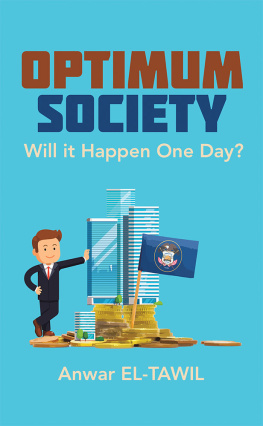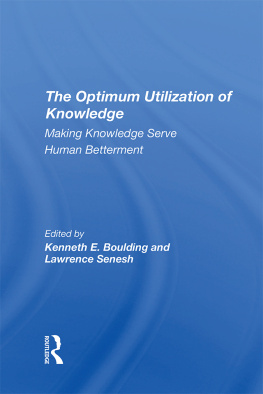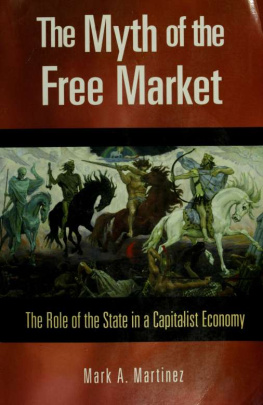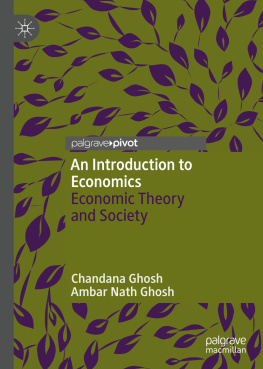Optimum
Society
Will it Happen One Day?
Anwar EL-TAWIL

AuthorHouse
1663 Liberty Drive
Bloomington, IN 47403
www.authorhouse.com
Phone: 1 (800) 839-8640
2019 Anwar El-Tawil. All rights reserved.
No part of this book may be reproduced, stored in a retrieval system, or transmitted by any means without the written permission of the author.
Published by AuthorHouse 11/13/2019
ISBN: 978-1-7283-3399-1 (sc)
ISBN: 978-1-7283-3398-4 (e)
Library of Congress Control Number: 2019917643
Any people depicted in stock imagery provided by Getty Images are models,
and such images are being used for illustrative purposes only.
Certain stock imagery Getty Images.
Because of the dynamic nature of the Internet, any web addresses or links contained in this book may have changed since publication and may no longer be valid. The views expressed in this work are solely those of the author and do not necessarily reflect the views of the publisher, and the publisher hereby disclaims any responsibility for them.
Contents
WHY THIS BOOK?
The twentieth century saw a combination of rapid scientific and technological progress and political turmoil. It seems that, as humanity became scientifically more knowledgeable and technically smarter, it remained unable to use science and technology to achieve prosperity and progress for most of the worlds population.
Indeed, as technology sharpened the weapons used in war and wars occurred more often between blocks of countries rather than between two countries only, the number of war victims has reached unprecedented figures. The combined victims of World War I, the War of Intervention against the Russian Revolution, World War II, the Korean War, the Vietnam War and the wars in Afghanistan, Iraq and Syria add up to 107 million dead. This number does not include the victims of wars between developing countries, civil wars and genocides within those countries. Nor does it include those wounded and disabled in those conflicts, who are many times the numbers of those dead.
These numbers are truly staggering. They could lead us to conclude that human beings are an inherently evil species, in particular, since these wars did not break out because they were absolutely necessary for the survival of one or more parties to the wars. Predators in the animal kingdom generally kill their prey because they need to do this to survive. It is well known that most predators kill the amount of prey they need to feed themselves and their young without exaggeration. Their instinct seems to guide them not to kill prey unnecessarily, to preserve it for future needs. Not so human beings, some of whom are known not only to cause the death of millions of other human beings, but also to indulge in overkilling of animals and overconsumption to a degree that harms their own health.
Most of the wars that took place during the past 100 plus years had the objective of gaining influence over territories and the peoples who live in them. During the intervention against the Russian revolution, in the course of and after World War II, the Western powers put forward ideological principles as the reason why they went to war. For example, the allied powers fought the axis powers in World War II in order to rid the world of fascism. The cold war continued for more than 45 years because the West was trying to uphold democracy against communism.
Reaching global agreement on the best political and economic system should eliminate the reasons that cause devastating global wars. Moreover, such agreement would be beneficial to humanity in many other respects, since it would permit using continually advancing science and technology to provide for the needs of people, ensure continuous progress and free humanity to achieve higher goals such as restoring the global environment, exploring the universe and establishing a secure place for humanity in it.
The principles claimed by the axis powers that fought in World War II, such as the superiority of one race and inferiority of others have been totally discredited. It is therefore not necessary to spend time disproving them. This leaves two sets of principles that have been competing for the attention of those interested in establishing an optimum type of society. These are the principles related to the good governance of a country, that is, the principles of democracy, and the principles related to social justice. The objective of this book is to discuss how these two sets of principles were applied in real countries and to see whether there is a way of combining them that would achieve a better life for the majority of people in the future.
The book consists of three parts. The first part deals with the advantages and disadvantages of the free market, democratic system. The second part deals with the experiences of a fully (or mostly) planned, more egalitarian economy. The third part is a reflection on the possibility of combining the advantages of both systems.
This book is not intended for professional economists. The language has been kept non-technical and basic economic principles are explained in simple terms. The book is intended to bring a condensed review of the main existing opinions on socio-political economy with reference not only to theories but also to their real-life application.

The free market system is the oldest economic system humanity has known. The invention of barter and the subsequent introduction of money allowed the specialization of craftsmen and increased their productivity many times. The bricklayer, the carpenter, the blacksmith etc. who exercise one craft only and exchange their products to satisfy their needs are many times more efficient than the jack of all trades, who needs to have skills and tools for several crafts and, in most cases, does not have them all.
The free market has never been totally free. In slave-owning societies, the slaves were not free to exercise a profession of their choice to the extent they wanted. They were obliged to do the work their owners wanted them to do. In feudal societies, the peasants in feudal estates were not free to leave the land or work for themselves. Some of them did escape from their feudal landlords and practiced trade and crafts in the cities and enlarged the city-dweller or bourgeois class. This class prospered thanks to the advantages of the free market. However, they were hampered in their activities by the feudal lords who set restrictions or exacted taxes from the merchants and artisans who wanted to buy, sell or work in their feudal estates.
As the balance of power turned gradually against the feudal and princely classes, the bourgeoisie went for complete liberalization of the markets through a number of revolutions. The French Revolution of 1789 is the typical example and the most famous of these revolutions. Similar revolutions took place in the more developed countries of the time and led to the establishment of free market economies that continue to exist today.
As the markets became wider, the small shop held by one person (or the family shop) had the possibility of dramatically increasing the volume of their trade or production. This led many shop owners to employ help in the form of hired hands. This was the beginning of an important division between the entrepreneur and the hired worker. As mass production became widespread, the single owners and family businesses became increasingly replaced by large, joint-stock companies, some of which grew even bigger to become multinational both in range of activities and ownership.
Next page







